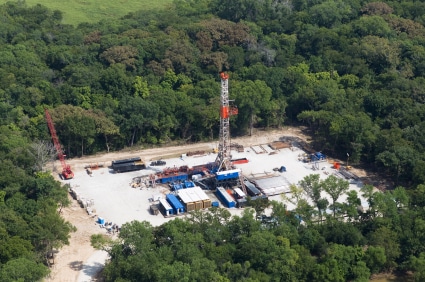
Natural gas drilling has gone under the microscope in Texas for the controversial drilling technique known as hydraulic fracturing, or fracking, and the proposed government rules meant to regulate it.
Industry supporters and environmentalists squared off at a public hearing in Arlington about regulations that the U.S. Environmental Protection Agency (EPA) proposed in June to limit pollution and public health problems allegedly caused by the technique, which uses horizontal drilling to access large, previously inaccessible stores of natural gas from more than a mile underground.
Industry advocates say that fracking is safe, or at least safe enough, and allows well operators to get at needed supplies of natural gas, while consumer and environmental advocates say the drilling technique leads to water and air pollution and to illnesses such as cancer.
The EPAs rules regulating fracking, proposed after a lawsuit was filed by two environmental organizations in July, seek to curb the practice by requiring that oil and natural gas well operators capture and sell the natural gas that is currently allowed to escape into the air. The agencys proposed rules would apply new pollution control standards to the roughly 25,000 natural gas wells that are hydraulically fractured in the United States each year.
Fracking Debate Highlights Fissure Between Prosperity and Public Health
The EPA hearing was contentious, perhaps made more so because of the venue. Arlington, which sits atop the natural gasrich Barnett Shale, is situated in a region with vast urban natural gas drilling. The region is crowded with people who profit from fracking and those who claim to have suffered from it. While one side of the aisle pointed to the jobs and prosperity that result from less-regulated drilling, the other side argued that the risk of toxic spills, drill site explosions, polluted air and tainted drinking water simply isnt worth it.
Teddy Carter, a spokesman for the Texas Independent Producers and Royalty Owners Association, said that the EPAs proposed rules were so complicated that compliance would not only be difficult, it would present a financial hardship that could threaten the states 5,000 oil and gas well operators and be especially hard on the smaller operations.
Carter said that the EPAs reduced-emission completion regulations should be encouraged but not mandated because one size does not fit all. According to Carter, regulation for regulations sake is a dangerous path that can potentially cause greater harm than good and the agency shouldnt be presenting solutions to problems that dont exist.
Several other members of the oil and gas industry joined Carter in urging the EPA to delay its current timeline, which would see the rules take effect next spring. The members asked the agency to extend its public comment period by 90 days and its final action date by six months to give companies more time to review the proposed regulations and plan for changes.
Critics of fracking who attended the hearing, including state Rep. Lon Burnam, a Democrat from Fort Worth, denied industry members claims that the process is safe. According to Burnam, fracking has caused air pollution in Texas to steadily increase over the past five years. Burnam told the hearing that he was tired of being sick and tired when companies talk about things like cost effectiveness and acceptable risks at the expense of the heath of children in his district.
Burnam went on to say that the EPA proposals would do what the Texas Legislature and state agencies that oversee oil and gas production have failed to do: protect public health by placing reasonable limits on air pollution that will both reduce emissions and increase industry revenues.
According to the EPA, its proposal, when fully implemented, could reduce emissions of smog-forming volatile organic compounds by about 25 percent, or roughly 540,000 tons, including reducing methane emissions by about 26 percent and hazardous air pollutants, such as benzene, by almost 30 percent.
To comply with the agencys rules, drilling companies would have to spend millions of dollars. However, the government estimated that the proposed regulations could save the industry almost $30 million by 2015 from sales of captured natural gas. Industry members disputed the governments claim.
Sources
EPA Holds Hearing in Texas on Natural Gas Drilling, Bloomberg Businessweek, Sept. 29, 2011.



